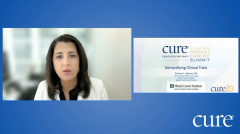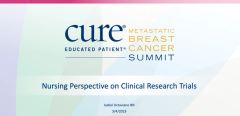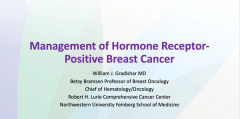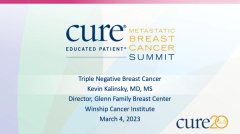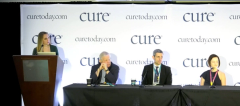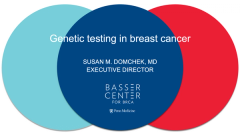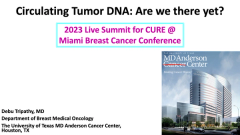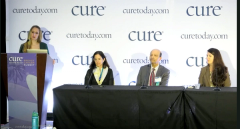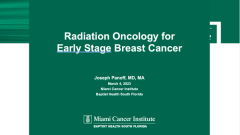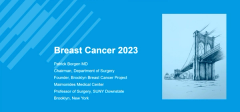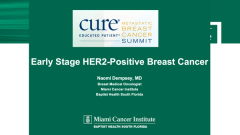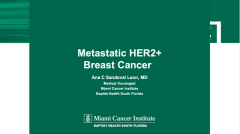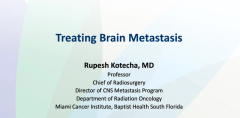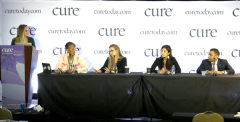
Educated Patient® Breast Cancer Summit at MBCC HER2-Positive Disease Panel: March 4, 2023
Watch Dr. Naomi Dempsey, Dr. Ana Sandoval Leon, Dr. Rupesh Kotecha and Ricki Fairley answer questions about HER2-positive disease during the CURE Educated Patient® Breast Cancer Summit at MBCC.
Episodes in this series

This panel was moderated by Kristie L. Kahl, and included Dr. Naomi Dempsey, a breast medical oncologist at Miami Cancer Institute, Baptist Health South Florida; Dr. Ana Sandoval Leon, a breast medical oncologist at the Miami Cancer Institute, Baptist Health South Florida; Dr. Rupesh Kotecha, chief of radiosurgery and director of Central Nervous System (CNS) metastasis at Miami Cancer Institute, Baptist Health South Florida; and Ricki Fairley, CEO and co-founder of TOUCH, The Black Breast Cancer Alliance.
Kahl: Ricky, can you tell us a little bit about your journey and your role with TOUCH?
Fairley: I'm an 11-year survivor of (triple-negative breast cancer [TNBC]). And I had stage 3A (disease). I did a double mastectomy, six rounds of (chemotherapy), six weeks of radiation. I was told I was NED (or no evidence of disease). I went back two months later for my annual checkup and had a PET scan, it showed five spots on my chest wall. And my doctor said, “Okay, you're now metastatic, I don't really have anything for you. So you have two years to live, get your affairs in order.” And I said, I had a daughter at Dartmouth, I have to pay for my kid to go to college. I have to work this out.
And so I went to Dr. Google, and everything on Dr. Google was you're going to die … and you're going to die fast. On the third page of Dr. Google, I found the Triple-Negative Breast Cancer Foundation. And I called … my best friend, she saved my life. And she said I'm going to find you a doctor. And I went to Dr. Ruth O’Regan at Emory, she was probably one of about five doctors in the country that were really studying TNBC. And she put me on carboplatin, and gemcitabine, which were experimental for TNBC at the time.
So it’s been 11 years and I'm (thankful to) be here to do this work. I started over the years doing a lot of advocacy. But I started looking at the numbers for Black woman. And I'm so happy to hear all of you guys talked about clinical trials, because we don't know enough about Black women and breast cancer. And so I've been on a mission to basically understand why Black breast cancer is different, and what we need to do about it to advance the science.
So last year, I started a movement called When We Trial, if you go to whenwetrial.org, we put together a website that basically educates Black women on clinical trials and understanding the science. We did some research to understand that clearly, they just don't understand the science. They don't understand what standard of care is. … And so we broke the science down and we have a video library of Black women talking so they can see people who look like them, explaining the science to them, explaining the science to us in a different way. And instead of going to Dr. Google and seeing pronouns like you and they, they see pronouns like we and us. And we changed the game on that. And we did a lot of social media, a lot of media and we did about 30 events across the country last year. And I wanted to go where Black women live, work, play, pray and slay. And we went into the community and looked them in the eye and talked about clinical trials. And since last May, we've signed up over 7700 Black woman for clinical trial portals. So we have a lot more work to do. I mean, I'm grateful for that number, but it's not enough. And so I love that you guys are talking about clinical trials. And I will go down fighting to get Black women into science. That's my purpose.
Audience: I'm a 16-year survivor from HER2-positive (breast cancer(. I was wondering the heart toxicity, is that only during treatment? Or do you need to worry about that at any later time?
Dempsey: So if you received an anthracycline, that toxicity can come later, not 16 years later, but usually something immediately after treatment to five years later time point. Sixteen years later, I think you're in the clear in terms of the toxicity from the HER2-related therapy, it's really while you're getting (treatment) and it is reversible. So as soon as we see on your echocardiogram that the heart function has dropped, we hold the drug and the heart function gets better. And we can actually reintroduce Herceptin (trastuzumab), even in people who have had a drop in their heart function. You know, normally if you've got issues with heart function because of the Red Devil, we're noticing it because your legs are swelling and you're getting short of breath. Whereas with trastuzumab, usually women aren't feeling anything. We're picking it up on the echo and we're dealing with it before they're having any clinical symptoms. But congrats to you. Sixteen years out that's incredible.
Audience: Okay, thank you. I'm just overwhelmed. I'm a three-time breast cancer survivor, HER2 positive. I was diagnosed when I was 29 years old. And I just want to say thank you, to all of you. You are the Tik Tok stars, you are the celebrities. I feel alive when I talk about cancer and breast cancer and surviving and thriving. So I am just so thankful to be in the room and just overwhelmed with joy right now. … I was 29 years old, I was aspiring to be a comedian. And I found out I had breast cancer. So it totally changed my world. But I share with people, especially Black women, because learning about my cancer, it taught me so much about myself, and taking care of yourself is taking care of the world around you. So I just want to say thank you.
Audience: All the radiation that you were talking about, did you perform any quality of life studies? I have a problem with what's ethical and moral. And I know that patients get to make choices. But when you extend life by a few months, the cost of treatment and the side effects. I'm just wondering, do you factor all that into those conversations and properly educate patients so they can make decisions for themselves?
Kotecha: That's a great question. So with whole brain radiation therapy, there is that issue of neurocognitive degeneration. And in some studies, it does affect quality of life. In some studies, we have not seen that much of a change. We actually track all of these metrics at our facility as well, because I do believe in that as well as quality of life is so important. And actually, for all of our patients who are receiving treatment for leptomeningeal disease who have that survival that's very limited, we do track actually their neurocognitive outcomes. And actually, in that same registry, we're now going to track quality of life as well.
In general, patients’ quality of life actually does get better when we use these radiation treatments, because we can reduce the burden of the disease. And that helps their symptomatology. So some of these deficits, for example, if they have a nerve deficit, because they have cancer sitting on a nerve itself, some of those can be improved. And out of all (side effects), the biggest side effect that's improved when somebody has extensive intracranial disease is for the headaches, because their persistent headaches are associated with nausea, vomiting, and there's nothing that helps those. You can't take enough Tylenol in the world to make those go away. And that's the first thing that we see get better when that radiation sets in. So even if there is not a survival improvement with some of our techniques, and sometimes, we still give whole brain radiation therapy for patients to improve their symptoms, more than anything else because we are thinking about their quality of life.
And we do tell them. And actually, there are patients that we tell, for example, who have very extensive intracranial disease, we're going to receive whole brain radiation therapy and a short course. And we tell them, this is not going to improve your outcome, your survival. But the goal of this treatment is to actually improve your quality of life. One of the metrics that has been used in some of the radiation studies for the brain is neurologic death. So people who are passing away and with symptoms from their intracranial disease, and what we're trying to do is reduce that or prevent that. So we want people to pass away, essentially, because of their systemic disease burden, but not with the symptoms from intracranial disease.
It is palliative, and that's why we work with our palliative medicine physician specifically so that both of us are talking to the patient with the same metrics in mind that we're trying to improve, or at least alleviate some of the symptoms to improve their quality of life.
Kahl: Ricky, we had a patient ask online, can you repeat the website that you mentioned?
Fairley: Whenwetrial.org. And if you go to the site, we have a video gallery, where we have a bunch of videos, so you can see yourself, you can see a Black woman explaining trials to you in a very elementary (way), easy terms to understand, and it'll make you want to do a trial, hopefully. So thank you for doing that. And I'm happy to help any of you guys recruit Black women for trials.
Dempsey: From the medical oncology perspective, this is something that we are all as a field really so invested in because we need to know whether for Hispanics, for Blacks, whether or not we're doing all the right things, whether it's going to be the same kinds of outcomes, because biology can be different and so we so appreciate your partnership on that.
Fairley: Thank you, we actually learned recently that the Oncotype test does not work on Black women, which is very scary. And so I mean, I think they didn't have enough women in the trial, to know whether it works. So a lot of work to do.
Kahl: We've heard a lot of, I think, promising and great things. And hopefully, we all have hope moving forward. So I just want to get each of your takes to close out the day of what we have to look forward to in the breast cancer space?
Fairley: I hope that we can change the game on Black women and Black breast cancer. That's my goal, my purpose. And I've heard a lot of talk here today and at (the Miami Breast Cancer Conference), and I'm hoping that everybody sort of has that as a top of mind consideration change in the science. And so I'm hoping that we can make that happen. That's what I'm working towards.
Dempsey: We are always very cautious to use the word cure when it comes to breast cancer. But you know, we all see that the research and the data is moving so fast, there's so many new drugs, there's so much better outcomes, and we hope that ultimately, we get to a point where we could talk about curing metastatic breast cancer and just see these advances really play out in terms of patients having better and longer lives. And that starts with all of you being here and getting educated and we appreciate your participation.
Sandoval Leon: I hope that patients can live longer and with good quality of life. And also, as I mentioned, that they exercise and they eat healthy, because that changes a lot the toxicity and everything and it's a message that I would like all patients to know that that's part of their treatment.
Kotecha: So I'm hoping that we will have some approved clinical trials potentially for screening for breast cancer brain metastasis so that we can pick this up earlier, and treat patients when they're asymptomatic when we potentially have more options for them, and then that we can further continue to personalize the radiation decisions that we make for patients.
Transcription edited for clarity.
For more news on cancer updates, research and education, don’t forget to


